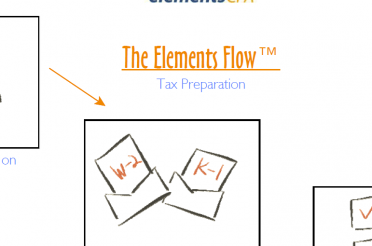 One of the hardest things for us to witness as business advisors and coaches is when entrepreneurs make self-defeating tax decisions because they’re unable to overcome a certain way of thinking.
One of the hardest things for us to witness as business advisors and coaches is when entrepreneurs make self-defeating tax decisions because they’re unable to overcome a certain way of thinking.
As we like to say, ‘Learn from mistakes, preferably someone else’s’, so below are three stories and three rules of thumb so you can avoid some common bad tax moves too.
Story 1: Reducing Income to Reduce Tax
One tax year we had a customer who was looking to sell a piece of real estate and wanted to avoid paying taxes at all costs. They were in the process of negotiating the selling price, and asked for help calculating capital gains for a few different scenarios. The first selling price lead to one tax, but they thought that was too much to pay the government. So they asked us to re-calculate using a lower selling price, and, predictably, the tax was a lower number too. That amount felt right to them, so they went with the below-market selling price, all to avoid paying Uncle Sam “too much”.
This example illustrates one of the first principles of tax: tax is a percentage of income – the more income, the more tax. In one sense, you want the highest tax possible, because it means you have the highest income possible, since ‘tax’ is just the government’s ‘cut of the action’.
So Rule #1: In general, your first goal should be to create the most income possible, because it maximizes what you keep even after the government takes its cut.
Story 2: Creating Deductions to Reduce Tax
Another tax year we had a customer who was expecting a business profit for the year, but really wanted to avoid paying tax. So they loaned the business money to spend on expenses (some even borderline), and as a result reduced taxable income. They succeeded in reducing their tax for sure, but they also shot themselves in the foot in the process.
First off, they violated Rule #1 by decreasing the amount they kept in their pocket overall. (Spending money on things you don’t need just to avoid tax is typically not a good move.) But second, by using a loan, they effectively shifted income to a future year which was going to have a higher tax rate, losing double-fold. (The reason income gets shifted, is the loan allowed them to claim the deductions in Year 1, but the loan would need to be repaid with cash in Year 2. And since loan repayments are not deductible, their Year 2 income was now higher than it would have been otherwise.)
So Rule #2: If you’re making any tax maneuvers, always consider the impact to future years, not just the current tax year.
Story 3: Saving Self-employment Tax
In our third scenario, a business owner came to us and had been in the habit of buying new equipment and writing it off every December for many years. His reason? To reduce income subject to Social Security and Medicare tax – it was nice not to have a sizeable tax bill, which seemed especially unjust after having worked so hard each year. The problem? He was getting closer to retirement, and years of ‘keeping the tax bill down’ had resulted in nominal Social Security benefits accruing. Added to that, he was trying to get a bank loan, and he wasn’t able to demonstrate adequate income levels to justify the size loan he wanted.
As you’re probably catching on, we’ve violated Rule #1, because buying equipment when the old would’ve done just fine reduced the overall wealth he kept over time. And we’ve violated Rule #2, because by writing off the new equipment in full every year meant that its cost wouldn’t be claimed over the equipment life, necessitating buying more equipment to get a deduction, and continuing the vicious cycle. But thirdly, we’ve also created a ripple effect for things that don’t even appear on the income tax return: retirement and borrowing strength.
So Rule #3: Don’t optimize your income tax to the detriment of the bigger picture. By limiting your field of vision to only what appears on the tax form, you’ll blind yourself to wider implications which are equally, if not more, important.
What the Real Goal Should Be
Many entrepreneurs think that the goal of taxes is to pay the least amount possible, but it’s not. It’s to optimize the amount of money you keep, and they’re not always the same thing. There’s a saying in the industry: “Don’t let the tax tail wag the dog.” All of the stories shared here illustrate this mistake: business owners who focused on the “tax” number, instead of the “keep” number.
For us it also emphasizes the foundational principle: the most effective use of an entrepreneur’s energy is to create value and wealth. Saving taxes ceases to be advantageous when it sacrifices wealth creation in the process.
To learn how you can save taxes in way consistent with creating entrepreneurial value, simply reach out to our Financial Design Team.







